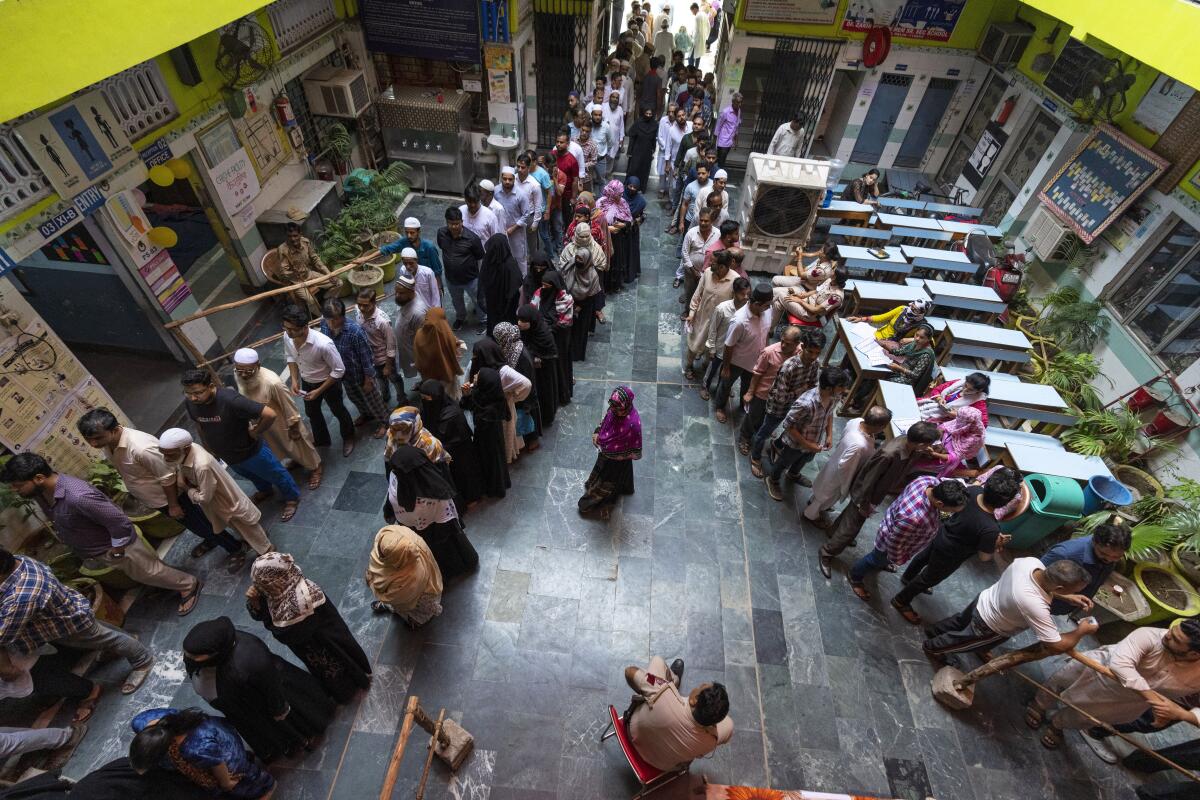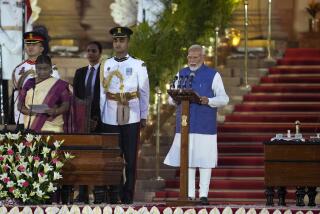Millions vote in India’s grueling elections with Prime Minister Modi’s party likely to win third term

- Share via
NEW DELHI — Millions of Indians voted Saturday in the next-to-last round of grueling national elections with a combined opposition trying to rattle Prime Minister Narendra Modi’s campaign for a third consecutive term for himself and his Hindu nationalist party.
Many people lined up at polling stations before the start of voting at 7 a.m. to avoid the blazing sun. The temperature soared to 109 degrees in the afternoon in the Indian capital.
“This [election] is also like a festival, so I don’t have a problem voting in the heat,” said Lakshmi Bansal, a homemaker.
Saturday’s voting in 58 constituencies, including seven in New Delhi, will complete polling for 89.5% of 543 seats in the lower house of Parliament. The remaining 57 seats will be decided June 1, wrapping up a six-week election. Votes will be counted June 4.
President Droupadi Murmu and External Affairs Minister Subrahmanyam Jaishankar were among the early voters. Opposition Congress Party leaders, Sonia Gandhi and her son Rahul Gandhi, also voted in New Delhi.
Prime Minister Narendra Modi, one of India’s most beloved and polarizing political leaders, has advanced the cause of Hindu nationalism.
Protests and violence marred voting in the elections that are considered some of the most consequential in India’s history and will test Modi’s political dominance. If Modi wins, he’ll be only the second Indian leader to retain power for a third term, after Jawaharlal Nehru, the country’s first prime minister.
Most polls predict a win for Modi’s Bharatiya Janata Party, or BJP, which is up against an opposition alliance led by the Congress and regional parties. But a less-than-expected turnout in the previous five rounds of voting has left doubts about the BJP’s projected margin of victory.
“When the polls began it felt like a one-horse race, with Modi leading from the front. But now we are seeing some kind of shift,” political analyst Rasheed Kidwai said.
“The opposition is doing better than expected and it appears that Modi’s party is rattled. That’s the reason you see Modi ramping up anti-Muslim rhetoric to polarize voters,” Kidwai said.
On Saturday, Mehbooba Mufti, a former top elected official of Indian-controlled Kashmir, held a protest alleging that scores of her party workers were detained by police to prevent them from voting. Mufti, the chief of the People’s Democratic Party who is contesting the parliamentary election in the Anantnag-Rajouri district, said she complained to election officials.
In West Bengal state, workers belonging to the All India Trinamool Congress Party blocked the car of a BJP candidate as she went to vote. Activists of the rival parties often clash on the streets.
India’s main opposition party has accused Prime Minister Narendra Modi of using hate speech at an election rally against Muslims.
Mamata Banerjee, Trinamool party leader and the state’s top elected official, accused Modi’s party of an attack that left one activist dead on Friday. Several houses and shops were burned in the Purba Medinipur district, the Press Trust of India news agency quoted Banerjee as saying.
Suvendu Adhikari, a BJP leader in the state, accused Trinamool members of attacking and killing an activist on Thursday, an accusation rejected by his rivals, the news agency reported.
Kidwai, the analyst, said the opposition challenged Modi by centering its campaign on social justice and rising unemployment.
Modi ran his campaign like a presidential race, a referendum on his 10 years of rule. He said he helped the poorest with charity and free healthcare, providing toilets in their homes and helping women get free or cheap cooking gas cylinders.
But he changed tack after a low turnout in the first round of the election and began stirring Hindu nationalism by accusing the Congress party of pandering to minority Muslims for votes. The opposition accused Modi of using hate speech after he called Muslims “infiltrators” — some of his most incendiary rhetoric about the minority faith — last month.
Hindus account for 80%, and Muslims nearly 14%, of India’s over 1.4 billion people.
Manish Bhatia, a New Delhi voter, said that “politics on the basis of caste and religion is dangerous for the country,” adding that voting should be based on how candidates perform.
Nearly 970 million voters — more than 10% of the world’s population — were eligible to elect 543 members to the lower house of Parliament for five years.
Voters’ relative apathy has surprised some analysts. In the five rounds of polling, turnout averaged 65.9%. By comparison, India’s 2019 national election registered the highest-ever turnout — 67.11%. Modi’s BJP won 303 seats in Parliament that year.
Modi’s inauguration of a massive Hindu temple for the god Rama, his massive roadshows and big public rallies raised the BJP’s hopes of a massive surge in voters’ support.
The prime minister came to power in 2014, dislodging the Congress party that governed the country for nearly 55 years after India won independence from British colonialists in 1947.
Before the election, the opposition INDIA alliance was seen bickering, but it has since held together, particularly after two chief ministers of two opposition-controlled states were sent to jail on corruption charges. Both deny the accusations.
One of them — New Delhi Chief Minister Arvind Kejriwal — has since been released on bail and returned to the campaign trail.
In March, Rahul Gandhi completed a 4,171-mile walk across the country, starting in the violence-hit northeastern state of Manipur, to raise awareness among voters about poverty, unemployment and democracy.
“The walk helped Gandhi boost his image as a serious politician among the voters,” Kidwai said, “and that is helping the opposition.”
Sharma writes for the Associated Press. AP journalists Sheikh Saaliq, Shonal Ganguly and Piyush Nagpal contributed to this report.
More to Read
Sign up for Essential California
The most important California stories and recommendations in your inbox every morning.
You may occasionally receive promotional content from the Los Angeles Times.















